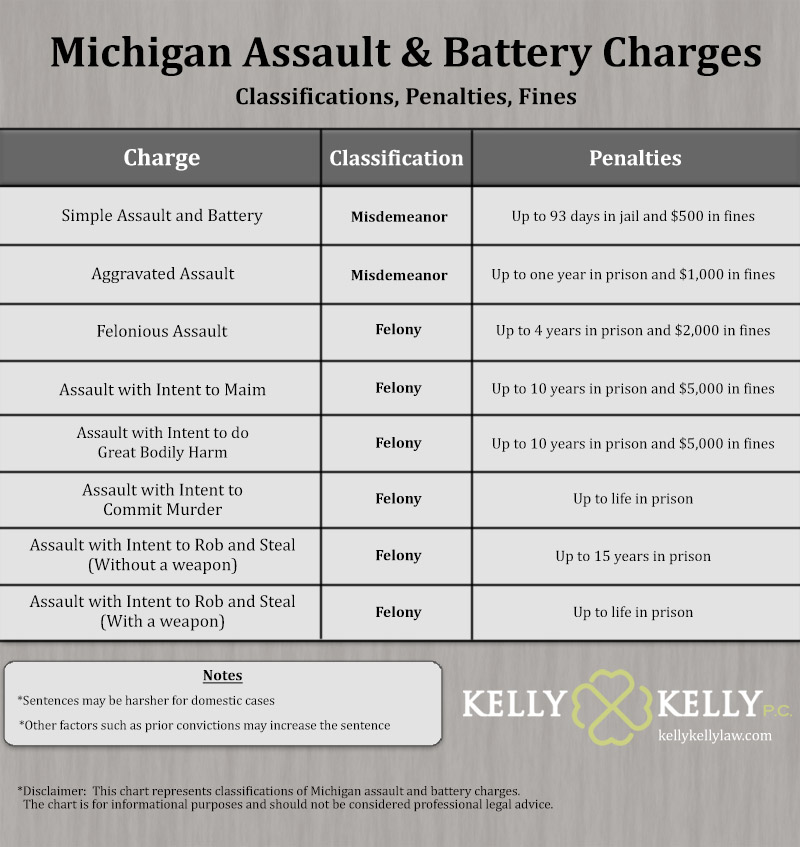
Partner, Juvenile Lawyer
Juvenile Assault Charges
Juvenile defense lawyers specialize in legal issues affecting minors. They advocate for young clients in court, addressing matters that may range from school discipline to criminal charges. This includes juvenile assault charges.
Kelly & Kelly P.C. has significant experience in juvenile law. Our attorneys provide legal representation for minors in various contexts ranging from school-related offenses to more serious legal challenges. Our team offers counsel and support for both individuals and families navigating the complexities of the juvenile legal system.
Your mistake doesn’t have to land you in jail or compromise your future.
Types of Juvenile Assault Charges
In Michigan, juvenile assault charges cover various offenses involving minors under 18 engaging in acts of violence or threats. These charges range from minor altercations to more severe physical attacks. Common juvenile assault charges include but are not limited to the following,
Simple Assault: Minor physical confrontations without significant injury.
Aggravated Assault: Attacks causing serious harm or involving weapons.
Assault with Intent to Commit Great Bodily Harm: Assaults aiming to cause significant injuries.
Assault with a Deadly Weapon: Using a weapon to threaten or cause harm.
Domestic Assault: Violence or threats within a domestic setting.
Sexual Assault: Any non-consensual sexual contact or behavior.
Juvenile Assault and Battery
Juvenile assault and battery are two distinct legal charges that involve minors. Assault typically refers to an act where a minor intentionally threatens or attempts to cause physical harm to someone, which creates a reasonable fear of imminent harm, even if no physical contact occurs.
Battery, on the other hand, involves actual physical contact where a minor intentionally inflicts harm or offensive touching upon another person without their consent. In the juvenile justice system, these acts are addressed with an emphasis on rehabilitation, considering the developmental stage of the youth involved.
Although assault and battery are generally used together, each of these charges can exist independently from one another. Simply put, assault refers to an act which causes a victim to sustain physical harm while battery refers to the actual act which caused injury.
Michigan Juvenile Assault Laws
In Michigan, juvenile assault laws address minors involved in acts of violence or threats. The state emphasizes rehabilitation, aiming to guide juveniles towards positive behavior changes. Sentencing for juvenile assault can include community service, probation, or detention in juvenile facilities, depending on the offense’s severity.
Michigan law seeks to balance holding youths accountable while providing opportunities for rehabilitation and reintegration into society, reflecting a commitment to both public safety and the future well-being of young offenders.
There are also other factors such as prior convictions that may impact the severity of the punishment. Below is a list of various classifications, fines, and penalties for A&B charges obtained from Michigan Compiled Laws MCL 750.81.
- Simple Assault and Battery
Misdemeanor punishable by up to 93 days in jail and up to $500 in fines. - Aggravated Assault
Misdemeanor punishable by up to one year in prison and up to $1,000 in fines. - Assault With a Dangerous Weapon (Felonious Assault)
Felony with up to 4 years in prison and fines up to $2,000. - Assault with Intent to Maim
Felony punishable by up to 10 years in prison and up to $5,000 in fines. - Assault with Intent to do Great Bodily Harm (less than murder)
Felony and sentenced to up to 10 years in prison and $5,000 in fines. - Assault with Intent to Commit Murder
Felony punishable up to life in prison. - Assault with Intent to Rob and Steal (Without a weapon)
Felony punishable by up to 15 years in prison - Assault with Intent to Rob and Steal (With a weapon)
Felony punishable by up to life in prison - Additional Michigan Assault Penalty Enhancements
All assault cases can carry harsher sentences if the crime was “domestic”. If the victim was a spouse, ex-spouse, significant other, someone you share a child with, or roommate, there’s a risk of having the sentence increased.
Self-Defense
In order to determine whether or not a person was acting in self-defense, the facts and circumstances of the incident must be taken into consideration. If you’re being charged with a violent crime in Michigan and you believe you acted in self-defense, it’s important to have experienced legal counsel representing your best interests.
According to the Self Defense Act in Michigan,
An individual who has not or is not engaged in the commission of a crime at the time he or she uses force other than deadly force may use force other than deadly force against another individual anywhere he or she has the legal right to be with no duty to retreat if he or she honestly and reasonably believes that the use of that force is necessary to defend himself or herself or another individual from the imminent unlawful use of force by another individual.”
Domestic Violence Crimes
Domestic Violence (DV) crimes in Michigan generally carry heavy penalties. It’s not uncommon for police to arrest a suspect when only hearing one side of the story. Furthermore, Prosecutors and Judges are quick in making decisions such as the enforcement of a “no contact order.” Whether you’re a victim of domestic violence, being wrongfully accused, the domestic violence lawyers at Kelly & Kelly are here to help ensure the Court hears both sides of the story and that legal rights are upheld for our clients.
Domestic Violence v.s Assault and Battery
Domestic Assault charges in Michigan have varying punishments ranging from a 93 day offense to a 5 year felony. The Michigan Legislature differentiates between a general assault and battery charge and domestic violence by determining whether or not the individual’s are in a “dating relationship.” For example, according to the Michigan Legislature MCL 750.81(2),
dating relationship means frequent, intimate associations primarily characterized by the expectation of affectional involvement. This term does not include a casual relationship or an ordinary fraternization between 2 individuals in a business or social context.
Frequently Asked Questions?
Q. What are juvenile assault charges?
Juvenile assault charges involve minors (typically under 18) committing acts of violence or threats against others. Battery charges refer to the unlawful physical contact or harm caused to another person.
Q. What are juvenile battery charges?
Juvenile battery charges involve a minor (typically someone under the age of 18) making unlawful physical contact with another individual, intending to cause harm, injury, or offensive touching. Unlike assault, which can involve a threat or attempt to commit violence, battery requires actual physical contact. The specifics of the charge can vary based on the severity of the contact, the circumstances surrounding the incident, and local laws.
Q. What is the sentence for a juvenile charged with assault?
The sentence for juveniles charged with assault can vary widely, depending on factors like the severity of the offense, prior record, and specific state laws, often focusing on rehabilitation. A juvenile can be charged with assault at any age under 18, but the exact age and how the case is handled can vary by jurisdiction, with some cases involving younger children being diverted to child welfare systems.
Q. How much time can a juvenile get for assault?
In Michigan, the time a juvenile can receive for an assault charge varies widely based on the assault’s severity, the juvenile’s age, previous offenses, and other circumstances. Sentences may range from community service and probation to detention in a juvenile facility. For serious offenses, juveniles could be tried in adult court, leading to longer sentences. It’s crucial to consult with a legal professional for specifics related to a particular case, as juvenile justice aims to balance rehabilitation with accountability.
Q. What age can a child be charged with assault?
In many jurisdictions, including Michigan, a child can be charged with assault at any age under 18. However, the specific approach to handling the case—such as whether to proceed through juvenile court or another intervention program—can vary depending on the child’s age, the nature of the offense, and local legal guidelines. For very young children, legal systems often focus more on rehabilitation and family support rather than formal charges.
This page was legally reviewed by Michael Kelly. Michael has been a practicing criminal defense attorney and juvenile lawyer for many years. Throughout this time he’s represented clients through various complex issues involving the education and criminal court system. This includes, representing students accused of criminal offenses, suspension/expulsion, DUI/OWI charges, expungements, and more. Michael has served on the ICLE Criminal Law Advisory Board and is recognized as top 10 Under 40 for Criminal Defense in Michigan by The National Academy of Criminal Defense Attorneys. He also regularly contributes to the Institute of Continuing Legal Education (ICLE) as a speaker on issues involving criminal law and juvenile defense.





